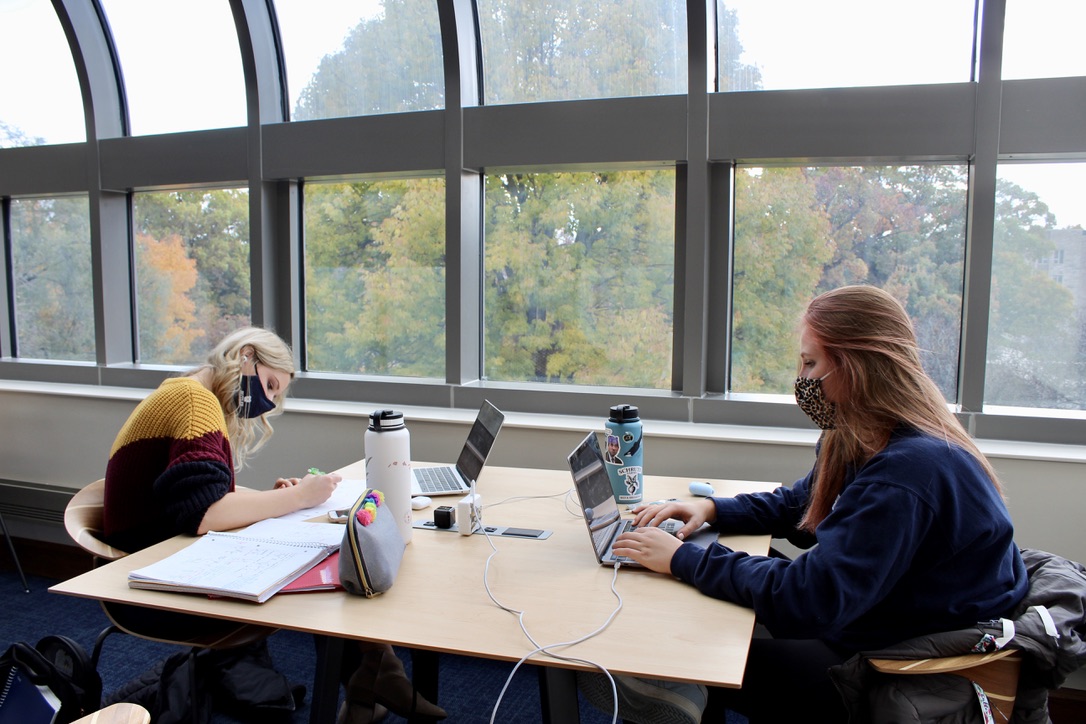Butler will continue some of the practices they started during the pandemic even after COVID-19 no longer poses a threat. Collegian file photo.
ALLISON MCELROY | STAFF REPORTER | aamcelroy@butler.edu
With only four active COVID-19 cases total among students and employees as of Oct. 29 and the recent announcement of an optional mask policy in non-classroom spaces beginning Jan. 3, 2022, Butler University seems to be getting closer to “normal.”
Throughout the pandemic, Butler, along with institutions worldwide, made changes in an effort to minimize the harm caused by COVID-19. Several measures still remain because of the benefits they offer beyond protecting public health.
One example of a lasting change can be seen within admissions. When the pandemic began in March 2020, all events related to admissions and recruitment were moved from fully in-person to virtual. This fall, as prospective students look to learn more about the university, Butler is offering a mix of both in-person and virtual options for events such as open houses and tours.
Director of Admission Jerry Dueweke said that while in-person tours are very important for making a college choice, having low-cost, easily accessible opportunities through virtual programs is helpful for prospective students, especially those who live far from campus. Virtual options have also allowed Butler to reach more international students, which Dueweke said could be one of the multitude of factors that made the class of 2025 the most diverse class of first-year students in history.
“… We’re kind of in a position of doing a little bit of mix and matching and creating opportunities for students to get exposed to Butler in whatever way works best for them at that moment,” Dueweke said.
While Dueweke noted that providing both virtual and in-person admissions events has required more work and coordination from Butler’s visits and events team, they plan to continue offering these options even when COVID-19 no longer poses a threat.
The pandemic also pushed Butler to make a change they had been gradually moving towards: test-optional admissions. With limited opportunities for prospective students to take ACT and SAT tests, many universities, including Butler, allowed class of 2025 applicants to abstain from submitting test scores. Now that Butler has officially made the switch to test-optional, Dueweke said they plan to stick with it permanently, with potential exceptions for certain programs.
“I think that’s another area where [the pandemic] broke down a few barriers and created access points for students of all socio-economic and racial ethnicities all across the board,” Dueweke said. “ I think again, you know, that’s part of what college admissions strives to do, not just Butler, but really nationwide, is to create access points for students.”
COVID-19 changes have not only had an impact on admissions. Another group that has experienced benefits is the Department of Student Involvement and Leadership, SIL. During the 2020-21 academic year, the SIL office introduced a policy of requiring students to use their Butler ID to check into all events associated with SIL or run by the University Programming Council.
The policy was originally implemented for COVID-19 contact tracing. However, the SIL office has now continued to use it because it provides key demographic information about event attendance that allows them to better serve students, according to Doug Benedict, coordinator of student activities.
Benedict explained that looking into how many students are coming to events and how much money is being spent in relation gives them a better understanding of their budget.
“Since we’re spending student dollars, we want to be as transparent as possible,” Benedict said.
Scanning into events with a Butler ID also gives the SIL office the information they need to solicit feedback from attendees through an email from Butler Engage. Benedict said that using these surveys, SIL can find out which events students enjoyed and know what changes should be made.
COVID-19 has led to changes in the classroom, as well. Junior pharmacy major Celine Kwan said that even as classes have returned to in-person, her professors started recording their lectures, which has helped her if she ever has to miss class. It has also had a positive impact on her studying.
“Sometimes I will go back and rewatch a lecture even though I was in class … going back and rewatching it is super beneficial just because they say things that are important and sometimes you don’t get all of it in class,” Kwan said.
Kwan also said that while COVID-19 generally had a negative impact on her social life, there was one positive. The pandemic allowed Kwan to deepen her relationships with the limited group of people she did spend time with. She explained that she and her roommate got very close last year with their neighbors across the hall in Fairview.
“If it weren’t for [COVID-19], we wouldn’t have been as close as we are with the people we are right now,” Kwan said.
While the changes brought about by COVID-19 may have been unwelcome at first, some are proving to have positive effects at Butler.



